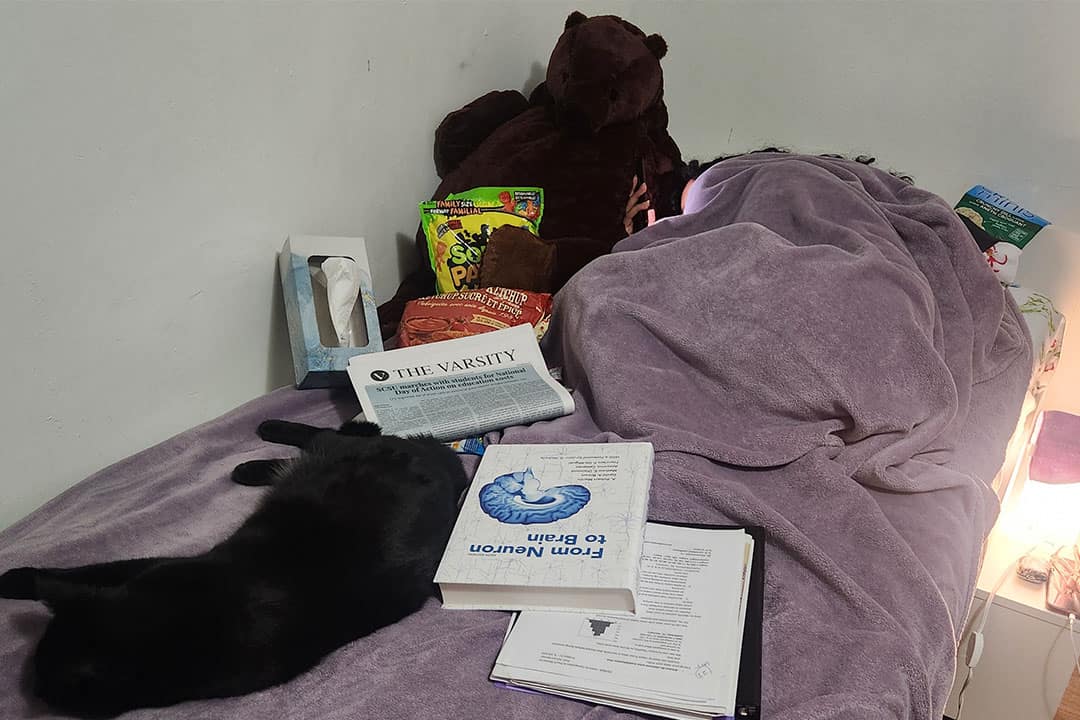When I asked my friends if they recognized the term ‘bed rotting,’ some of them looked at me with confusion, having not been privy to the latest vapid TikTok term. According to an article from health.com, ‘bed rotting’ can be defined as “staying in bed for extended periods — not to sleep, but to do passive activities like eating snacks, watching TV, and scrolling through devices.”
We’ve all been there for a myriad of reasons. But bed rotting goes beyond those days when it’s rainy and you just want to watch TV and snuggle up with some popcorn — it’s the act of neglecting yourself and conducting your life from your bed. Although we all may be guilty of bed rotting, we should be wary of normalizing it in high doses.
In reality, chronic bed rotting has some serious mental health side effects. It takes away time that could be spent meaningfully connecting with loved ones, according to Courtney DeAngelis, a psychologist at NewYork-Presbyterian/Columbia University Irving Medical Center. She explains in the health.com article that bed rotting “takes away the opportunity to engage in physical exercise, which can also help to improve sleep quality and sleep onset.” Additionally, endless scrolling through social media may cause self-image problems, never seeing the sun can result in a lack of vitamin D.
In some ways, bed rotting seems like a rebellion against the constant push of hyper-productivity. ‘Hustle culture’ has guilted many people into equating constant stress and overstimulation with happiness and fulfillment. DeAngelis concedes that, in small doses, resting in bed can calm the body and help ease stress and exhaustion, especially for people working long hours in a physically or mentally demanding role. Taking time for yourself is necessary to recharge your batteries once in a while.
Nevertheless, I reckon that there is a delineation between intentionally relaxing for a set period of time and endlessly crying or doom-scrolling on social media in bed. When the clothes start piling up like pancakes, when you begin to feel like a vampire who hasn’t seen natural light for a few days, and when your room smells like a coffin — that’s when you know you’ve entered bed rotting territory.
Especially at a school like U of T, whose reputation when it comes to student mental health is abysmal, finding a balance between relaxation and depressing behaviour is important. On one hand, in a competitive academic environment defined by cramming and stressing, finding moments of rest and peace of mind is crucial. On the other hand, staying in bed late into the night or well into the morning, surrounded by crumbs, eyes strained from watching movies and scrolling simultaneously is perhaps not a version of relaxation we should romanticize.
I recently saw a viral TikTok by a 23-year-old woman lamenting that her bed-rotting ways have resulted in a lack of interesting stories to tell her future grandchildren. Wasting your youth is already a common fear among many young people, and now this fear is exacerbated by the frequency with which they spend exorbitant amounts of time in bed. It is particularly unfortunate to see a young woman like myself expressing this sentiment, knowing that the short-term comfort she received from bed rotting has caused her long-term dissatisfaction.
Occasionally — maybe while bed rotting — you can find me listening to well-known bro podcaster and TV personality Chris Williamson. In an interview with Eric Weinstein, Williamson pitches the concept of “2D lessons and 3D lessons.” According to Williamson, a 2D lesson involves second-hand learning, like reading a book, while 3D learning would be active, experiential learning.
I suspect that Gen Z’s chronic bed rotting is in part due to our fear of facing 3D lessons. We can read a romance novel from our bed, but asking out our crush? Too intimidating. We can watch our favourite vlogger pursue their aspirations, but for us to risk the pain of rejection? Never. In summary, it’s much easier to live vicariously through the characters of a Netflix show or vloggers on the internet from your bedroom than face the cruel dark world that lies beyond. When all is said and done, there is only so much information one can take in from a sedentary state before you start to wonder if you’re missing out on 3D lessons.
Here is my final bit of subjective advice to myself and everyone who has ever ‘bed rotted’: if you need to rot once in a while, fine — take a day to decompress. However, don’t forget that you have agency in regard to how long you stay in bed. If you find yourself bed rotting more than usual, this may be a sign to reach out to family and friends or even a mental health professional. Do not let the fear of wasting your 20s paralyze you from living them. Real-world interactions will bring you heartbreak and rejection, but they will prove to be worth it when you find meaningful and fulfilling relationships.
For students struggling with their mental health and in need of support:
- Visit U of T Mental Health Services to find the right support options for you
Visit CAMH for a list of helplines for mental health crises



No comments to display.